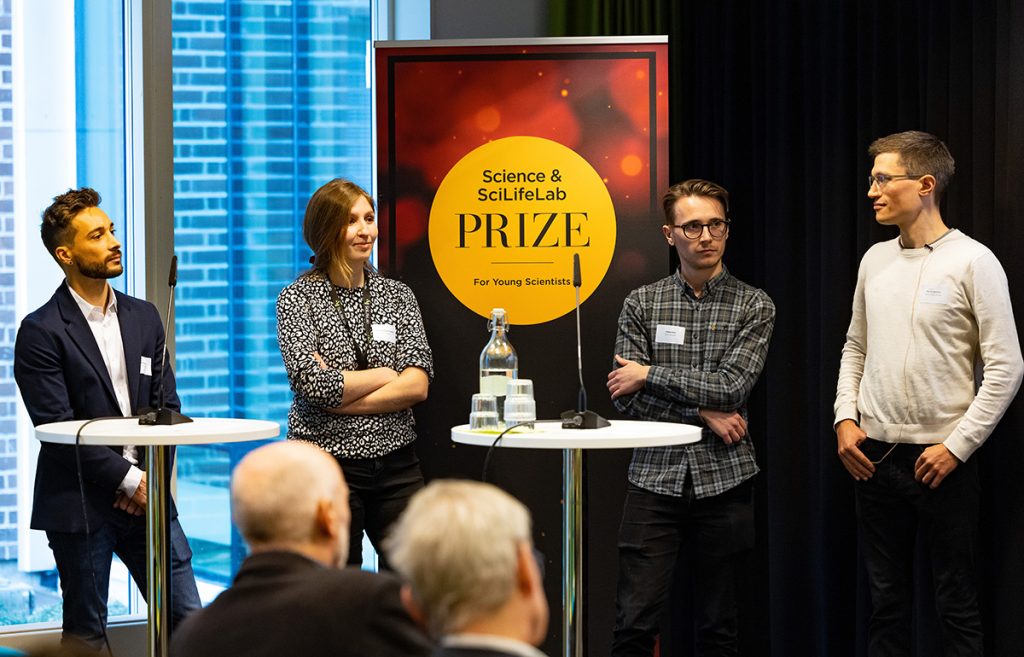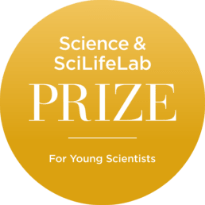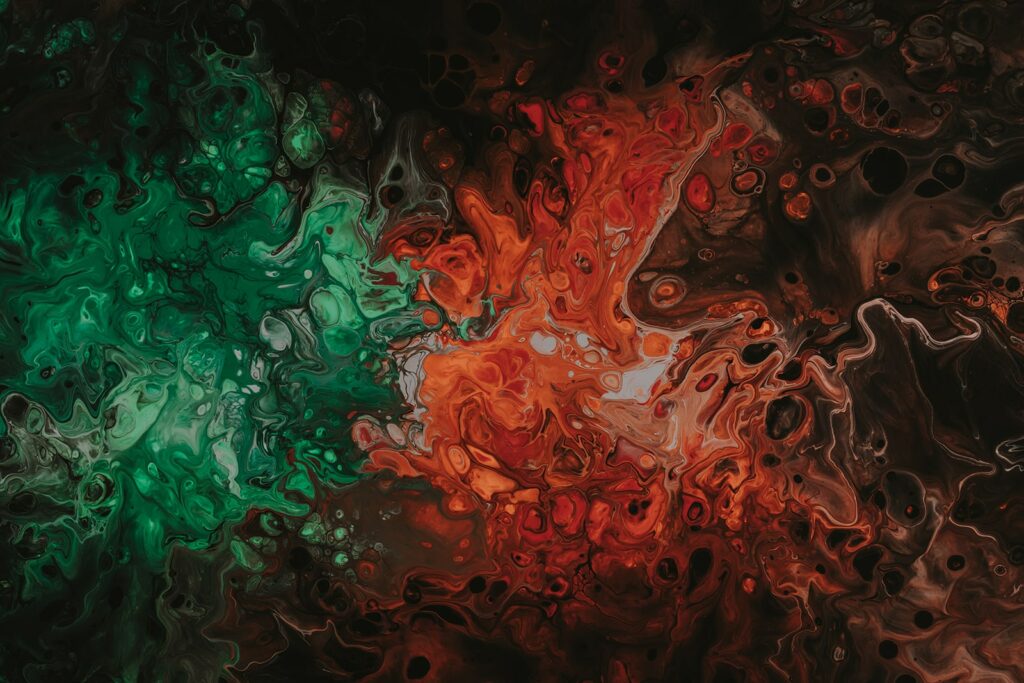About the prize
The Science & SciLifeLab Prize for Young Scientists was established in 2013. A global Prize aimed at rewarding scientists at an early stage of their careers.
Science, the American Association for the Advancement of Science (AAAS), and SciLifeLab, joined forces in creating the Science & SciLifeLab Prize for Young Scientists to recognize excellence amongst young researchers from around the world. The Prize was launched with the vision to recognize that global economic health is dependent upon a vibrant research community. A vision that will only come true if we encourage our best and brightest to continue in their chosen fields of research.
Considering the difficult economic environment for budding scientists, it is crucial that we provide them with extra encouragement as they begin their scientific careers.
The international Prize is awarded annually to four young scientists for outstanding life science research based on a doctoral degree earned in the previous two years. Each year, a Grand Prize winner is selected from the applicants to receive 30,000 USD in prize money and the three other category winners are awarded 10,000 USD each for their accomplishments.
The Science/AAAS and SciLifeLab Prize committee is looking forward towards reviewing the research findings from future entrants!
The grand prize winning essay will be published in Science and essays from the three category winners will be published online.
In addition, all four winners of the Science & SciLifeLab Prize for Young Scientists will be invited to Sweden in December 2025 to participate in a unique week filled with events in honor of science. Here they will have the opportunity to meet with leading scientists in their field of research and create life-long connections to support their career.
The annual award ceremony and banquet is held in the Grand Hôtel Hall of Mirrors in Stockholm – the original venue of the Nobel Prize banquet.
The 2025 Categories
Frequently Asked Questions (FAQ)
Listed below are common questions and answers about the Science & SciLifeLab Prize for Young Scientists.
The Science and SciLifeLab Prize for Young Scientists was initiated as a collaboration between SciLifeLab in Sweden and Science magazine/AAAS. It is co-funded by the Knut and Alice Wallenberg Foundation, a Swedish philanthropic organization that is one of the largest private financiers of scientific research in Europe. Read more about the prize sponsors.
The Science and SciLifeLab Prize for Young Scientists was created to recognize early career researchers (within two years of earning their PhD). It is one of the few prizes awarded to young scientists and perhaps the only one specifically for life science researchers at the start of their careers.
While a number of prizes exist to recognize scientists in various life science fields, many of these awards are only given to scientists in a specific country or narrow field of work, or only to those with decades of significant work and dozens of published articles behind them.
Science & SciLifeLab realized the importance of recognizing the work of young scientists in order to encourage them to continue with their scientific endeavors and lead the way for new discoveries. Identifying these young researchers early in their careers may open opportunities for them that could bring about exciting new advances in the fields of life science.
The prize was first awarded in 2013, and it is awarded annually.
Cell and Molecular Biology
Research in this category includes cellular and molecular processes at levels ranging from single molecule to single cell to tissue and organ systems.
Genomics, Proteomics and Systems Biology Approaches
Research in this category focuses on genomics, proteomics, integrative omics and systems biology approaches, inlcuding computational, to facilitate comprehensive understanding of living cells, organisms and species.
Ecology & Environment
Research in this category encompasses interactions between organisms and their environment, and how these processes are influenced by human activity.
Molecular Medicine
Research in this category aims at building on the molecular understanding of disease in humans to develop preventive, diagnostic and therapeutic approaches, including individualized medicine.
The winners are selected by a committee of scientists chaired by the Editor-in-Chief of Science magazine.
Entries are first screened by Science editors and three finalists are selected from each category. Then, the committee selects the winner from each category. The four category winners compete for the grand prize. The grand prize winner and three category winners will be decided in October. The entire process for selection and announcement of winners is organized and run by Science.
The grand prize winner receives $30,000 USD and each of the other three category winners receives $10,000 USD.
In addition, the grand prize winning essay is published in Science magazine and each of the other three winning essays are published at Science online.
Furthermore, all four of the award winners are invited to Sweden for the prize ceremony, held the same week as the Nobel Prize ceremony, attend a scientific symposium to present their work, and be invited to a series of social events in which they are able to network with notable scientific researchers in their fields. Each winner may also bring one guest to the festivities.
Entrants for the prize must have received their Ph.D. between January 1, 2023 and December 31, 2024. Entrants may only apply once within this time period, and the work described in the entry must have been performed while the entrant was a graduate student. The prize is open to residents of all nations without regard to sex or race.
In addition to completing an online entry form applicants must submit an essay describing their thesis work in one of the qualified categories. The essay cannot exceed 1,000 words in length and may include one figure or table.
Applicants must also submit a one-page reference letter from their advisor or a member of their thesis committee with an assessment of the applicant and comment on the significance of the applicant’s research.
In addition, a list of citations, awards and relevant professional experience should be included, as well as an abstract of the thesis.
The application form can be found at the Science website.
Winners are selected in October and announced in November each year. The awards ceremony is held in Stockholm during the first week of December, the same week that the Nobel Prize ceremony and banquet take place.
The deadline is July 15 2025. Apply at the Science website.
Prize event week
Award ceremony and banquet
The four winners of Science & SciLifeLab Prize for Young Scientists are recognized and celebrated at the award ceremony in Stockholm. It is set in the exclusive Hall of Mirrors at the Grand Hotel – the original venue of the Nobel prize banquet (1901- 1929). At the event, they will meet with e.g. leading researchers, representatives from sponsoring organizations and fellow award-winning young scientists.
Scientific program
The winners will partake in a series of scientific events, including a symposium coordinated by SciLifeLab. In addition, SciLifeLab will offer a tour of its facilities and give the prize winners an opportunity to learn more about this national center and its technological facilities for high-throughput molecular biosciences.
Social events
The social program includes e.g. a dinner hosted by Science/AAAS, where the winners of Science & SciLifeLab Prize for Young Scientists – and their plus-ones – get to interact with each others, with editors of Science magazine, as well as with the management of SciLifeLab. Each winner may also bring a guest to stay at the hotel and participate in all the events (conditions apply).



